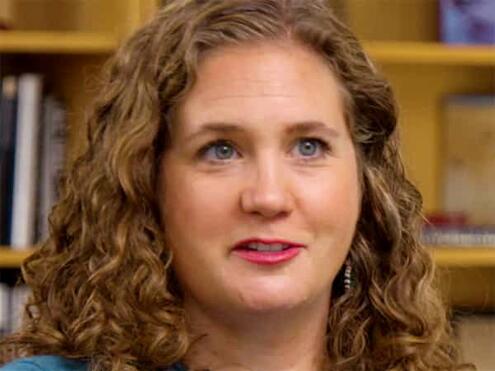ASK A SCIENTIST ABOUT COVID-19 VACCINES
What is a coronavirus?
JENNIFER NUZZO: Coronaviruses are a large group of viruses that can infect humans and they can also infect animals. It's a common cause of the common cold, so chances are in your life you've had a coronavirus infection. But coronaviruses also infect animals, and occasionally, one of the animal viruses can jump to human beings and be a completely new virus that human beings have never experienced before. And that's where it can be quite serious. It can cause serious disease or even lead to epidemics or pandemics.
Have there been coronavirus epidemics in the past?
JENNIFER NUZZO: We've actually had experiences with new coronaviruses that have jumped from animals to humans in the past. So the first situation was in 2003 where a new coronavirus jumped from animals to humans and went on to cause an epidemic that sickened about 8,000 people in the world. That was called SARS, the SARS epidemic of 2003. And then later we had something called MERS, which was Middle East Respiratory Syndrome. That was first noticed in Saudi Arabia.
But there are a lot of coronaviruses out there that do commonly infect humans. In fact, coronaviruses are one of the most common causes of the common cold. When we're infected with a coronavirus that causes a common cold, we don't get quite as sick as we might when we're exposed to a virus that our immune systems have never seen before.
How did coronaviruses get their name?
JENNIFER NUZZO: Coronaviruses got their name because the first time we were ever able to see a picture of them through using a special microscope, it was noticed that they had these spikes all around the surface of the virus. The spikes look like a crown. We also interestingly see similar shapes on the sun. And that's actually called the solar corona. But the word corona means crown and that's how they got their name. The spikes on the coronavirus is the spike protein. And the virus uses that spike protein basically like a key to unlock an entry into your cells.
What is COVID-19?
JENNIFER NUZZO: COVID-19 is the disease caused by the coronavirus that we call SARS-CoV-2. It's a respiratory disease, and so the virus typically infects your respiratory system, so your eyes, your ears, your nose, your throat. You may breathe it in. It infects the cells in the respiratory tract, and it damages the cells in doing so.
Then your immune system realizes that something's going on, and your immune system shows up to try to defeat the virus, and in doing so, may actually also do a little bit of harm to your cells. And that causes a whole cascade that makes people feel sick. And in the process of these cells getting harmed, can make it difficult for people to take in oxygen that their body needs. And so that's why it's quite a serious disease and why some people can get quite sick, and ultimately, some people can die.
How did scientists develop the COVID-19 vaccine so quickly?
JENNIFER NUZZO: Ever since we found that a coronavirus could jump from animals to humans and cause serious disease, scientists have been working on developing new vaccines for coronaviruses for the purposes of if a new coronavirus were ever to emerge, say jumping from an animal to a human, that perhaps we could have a vaccine to protect humans. So scientists have been working on developing coronavirus vaccines since pretty much that first epidemic in 2003.
How do we know that the COVID-19 vaccines work?
LISA COOPER: We know the COVID-19 vaccines are effective because once we began to administer the vaccine to certain groups of people, we noticed that their death rates, hospitalization rates, and their infection rates went down dramatically. So for example, we started out with people over age 65, those who were very vulnerable to getting COVID-19 and dying from it. And we saw their death rates go down dramatically.
And now, that's continued to be the pattern across the country as we've seen the vaccine rates go up. And in the areas of the country where we have lower vaccine rates, we're actually seeing higher rates of COVID-19. So that's how we can really tell that it's more effective.
What are mRNA vaccines?
JENNIFER NUZZO: Scientists have also been working on developing messenger RNA technology that can be used to make vaccines. And messenger RNA vaccines are really interesting because they allow us to give your body very specific instructions to make a very specific part of the virus. Not the whole virus, just a very tiny part of it. So that it can train your immune system to go after the virus as soon as it sees it.
Does the mRNA vaccine contain the virus?
JENNIFER NUZZO: The vaccines themselves do not contain the virus at all. It contains instructions for how to make a tiny piece of it, the spike protein. The spike protein is the protein that the virus uses as a key to unlock a entry into your cells. And your immune cells look at that spike protein, study it, and use that information to know that if it were to ever encounter the virus that would have that spike protein on its surface, it should attack it. And that helps your body fight infection.
Does the mRNA vaccine change my genes?
JENNIFER NUZZO: The messenger RNA that your body cells take up do not in any way interact with your cell's own genetic material. In fact, they don't even go to the part of your cell where your genetic material is. But your cells can use those instructions to make the spike protein so that it can train your immune system that if it were to ever see that in the form of a virus, it should attack it.
What else can we do with mRNA technology?
JENNIFER NUZZO: Messenger RNA technology for vaccines is a complete medical breakthrough. I'm excited about them not just because it can improve the vaccines that we have, but it can also help us treat very important diseases like cancer that we've been long wanting better treatments for.
Should kids get vaccinated?
LISA COOPER: I think it's really important for young people also to get vaccinated against COVID-19. There's a lot of information out there that shows that younger people don't tend to get sick at the same rates when they get infected with COVID-19. Many of them don't have a lot of symptoms or don't end up in the hospital or dying from it. But some people do. A significant proportion of young people have gotten sick and have been hospitalized and have actually died from COVID-19.
Also, there are long-term effects from COVID-19 that we don't know about yet. And so we know about some of them. And so people have had long-standing symptoms, things like headaches, depression, problems with their heart or their kidneys, blood clotting disorders. That can happen as a result of having COVID-19. So even if you're young and healthy and you survive COVID-19, you could end up with a complication later on. So it's really important, I think, even as a young person that you do that for your health.
Why should I get vaccinated?
LISA COOPER: We know there are lots of reasons to be vaccinated. One of them is just to protect ourselves from getting sick right now from COVID-19. The other one would be to protect people around us from getting sick, because even though we might not feel like we are vulnerable or that we are going to get very sick, it could be that we would get exposed and then transmit it to someone else.
So those are some of the reasons, but another reason to get vaccinated now is that what happens is that the more people that are unvaccinated, the virus gets a chance to infect those people, but then also to change the way it works.
And so in many ways, that makes it harder for vaccines that are already out there to continue to be effective, because now, the virus has changed in such a way that the vaccine no longer works. That's what viruses do. As long as they circulate and they're still around, they can keep changing. And they change because viruses want to infect as many people as they can.
Does the vaccine stay in my body forever?
JENNIFER NUZZO: When you get vaccinated, your muscle cells take up the vaccine. In the case of mRNA vaccines, your muscle cells take up messenger RNA that your muscle cells use to make the spike protein, which is the protein that the virus that causes COVID-19 uses to enter your cells. Your cells make that spike protein so that your immune system can see it and be trained to recognize it. And that will help your immune system respond more quickly if you ever encounter the virus.
The vaccine, though, doesn't circulate around your body. It's just taken up by your muscle cells, the muscle cells use the mRNA, they make the spike protein, your immune system goes after it, and then, after a few weeks, it's gone. Gone from your body entirely. No more spike protein, no more vaccine, gone.
What's left behind, though, is the knowledge of what that spike protein looks like, and your immune system uses that knowledge to respond if it ever sees the virus trying to enter your body.
How are vaccines tested?
LISA COOPER: Vaccines are tested through clinical trials, and a clinical trial is a study where a certain number of people who are in the study receive the vaccine and a certain number of people who are in the study don't get it. So we compare what we call the experimental group or the vaccine group to a control group or placebo.
So that means they get probably something that is like saline, salt water injected into them, but it's not anything that has a biological activity, and then people who actually get the real vaccine, and we try to compare those two groups.
Why is it important to have different kinds of people participate in vaccine trials?
LISA COOPER: I think it's really important that the COVID-19 vaccine has been tested in people of a wide range of ages, demographic groups, things like by race and ethnicity in both men and women, as well as in people who have certain diseases. People with chronic diseases like heart disease and diabetes.
One of the reasons that's really important is because on one hand, we want to make sure that the vaccine is safe and people regardless of what age they are or what gender they are. But we also want people to be able to see themselves among the people who have been tested.
Because that also makes people feel like I could imagine myself getting that vaccine. If it's been tested in people who belong to my same social group or people who come from my community, that means that they found it acceptable and it worked for them. So a lot of times it's not so much about the biology. But just more about people seeing themselves in the people who participated in the trials.
Who participates in vaccine trials?
LISA COOPER: I think that vaccines have been tested in a wide range of age groups and in men and women for many years. I also think that there has been increased focus on trying to get people from different racial and ethnic groups in different parts of the world involved in those kinds of studies over time.
So many, many years ago, people who could afford to participate in trials or who actually could understand more about the trials or just had more access to that information, because they already had a doctor, they were more likely to be involved in those trials. And when the results came out, people wondered if, well, if the vaccine's only been tested in people who live in northern Europe, does that mean that it would work for me? Because I live in South America or Africa.
What is a variant?
JENNIFER NUZZO: When viruses enter our cells, they start to replicate, making copies of themselves. And as they do that, mistakes can happen, and those mistakes can give rise to genetic variants, variations in the genetic code as a result of mutation. Sometimes those variations make the virus act differently than the previous version of the virus.
For example, the SARS-CoV-2 virus, there's something called the Delta variant. One of the features we think of the Delta variant is that it is capable of spreading between people much more quickly than earlier forms of the virus, and that has come about as a result of a mutation in the virus itself that gives it these new features.
What is herd immunity?
LISA COOPER: Herd immunity typically means that you have enough of a population that's protected from some harmful infectious agent, like COVID-19, or, for example, like influenza or polio. You have enough people protected such that if there's someone who gets an infection, it will not spread throughout that community or throughout that population. And it actually protects a lot of people who aren't infected from ever getting exposed, because so many people are already protected.
Why do scientists collect data about infection rates?
LISA COOPER: Data is very important to arriving at solutions in public health and also at monitoring our progress. So if we don't know where the problem is or who's impacted by it, it's going to be very difficult for us to come up with a solution. So we really need very good data about who is being impacted by which problems and where. And we need to look at the interconnections between exposure to see what could be causing certain groups of people to become ill at different rates.
So data is critically important. We use that data to inform where we go, who we target, and how we come up with our solutions. And then we use data over time to monitor our progress towards a solution.







 Biodiversity
Biodiversity
 Brain
Brain
 Genetics
Genetics
 Marine BiOLogy
Marine BiOLogy
 MicrobiOLogy
MicrobiOLogy
 PaleontOLogy
PaleontOLogy
 ZoOLogy
ZoOLogy
 AnthropOLogy
AnthropOLogy
 ArchaeOLogy
ArchaeOLogy
 Astronomy
Astronomy
 Climate Change
Climate Change
 Earth
Earth
 Physics
Physics
 Water
Water
